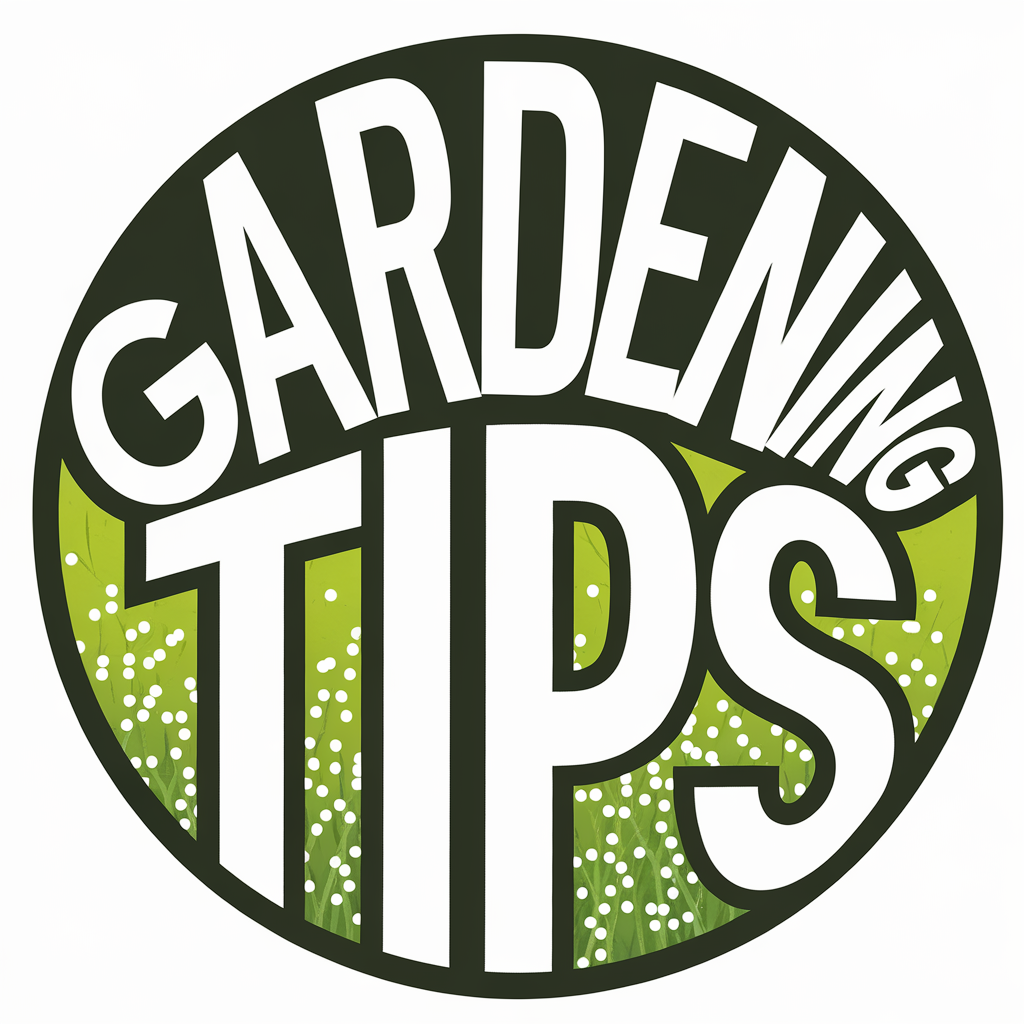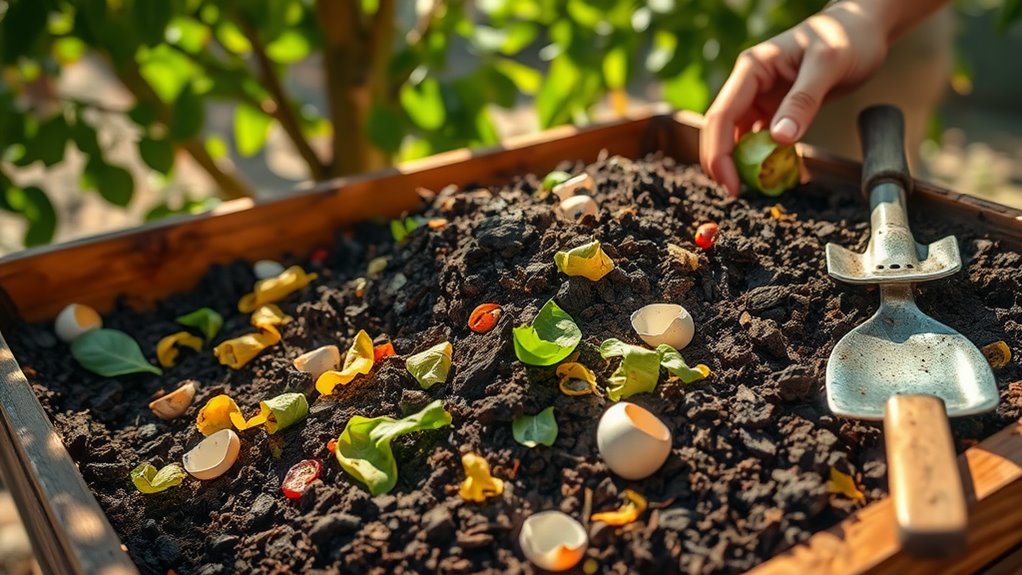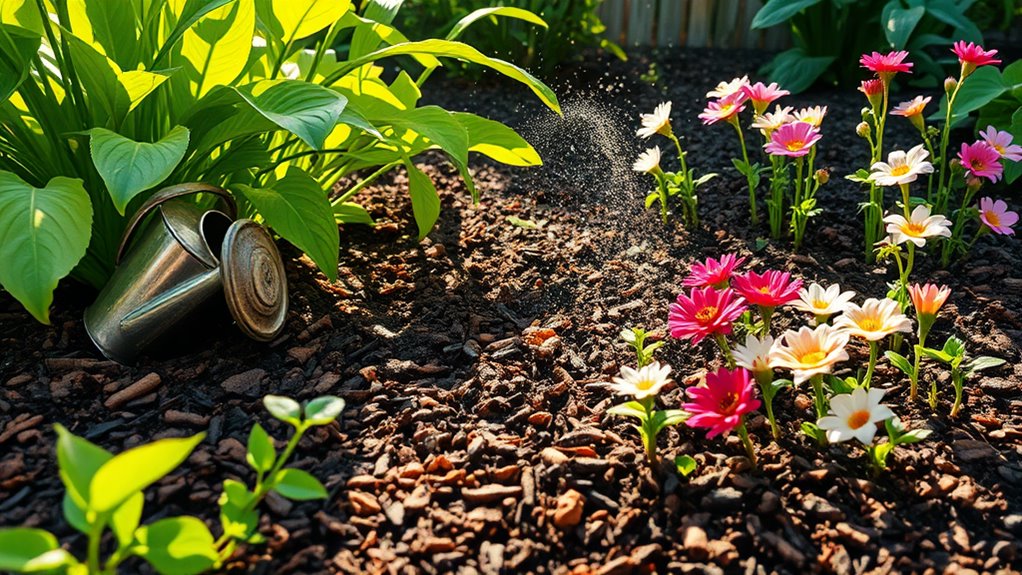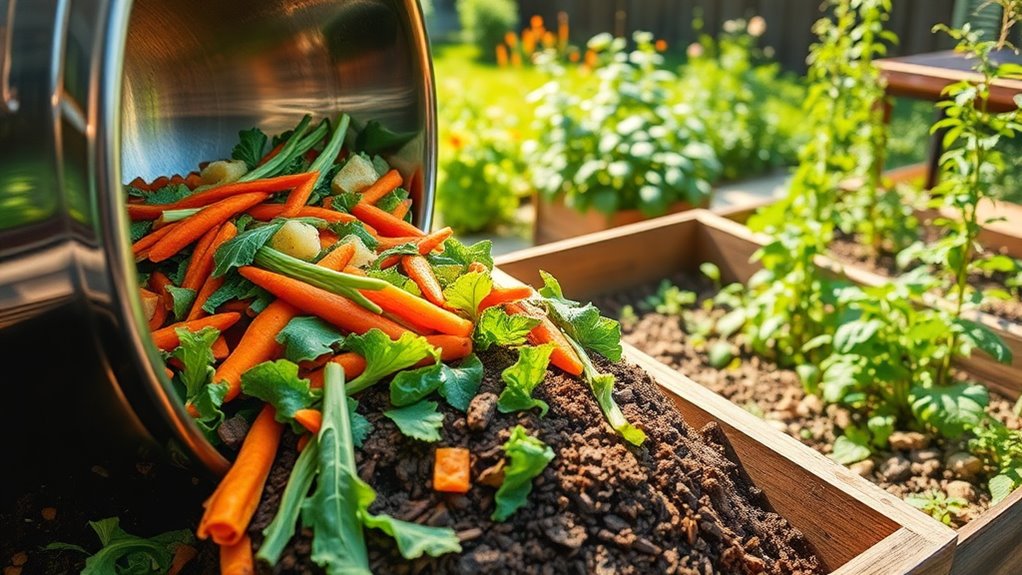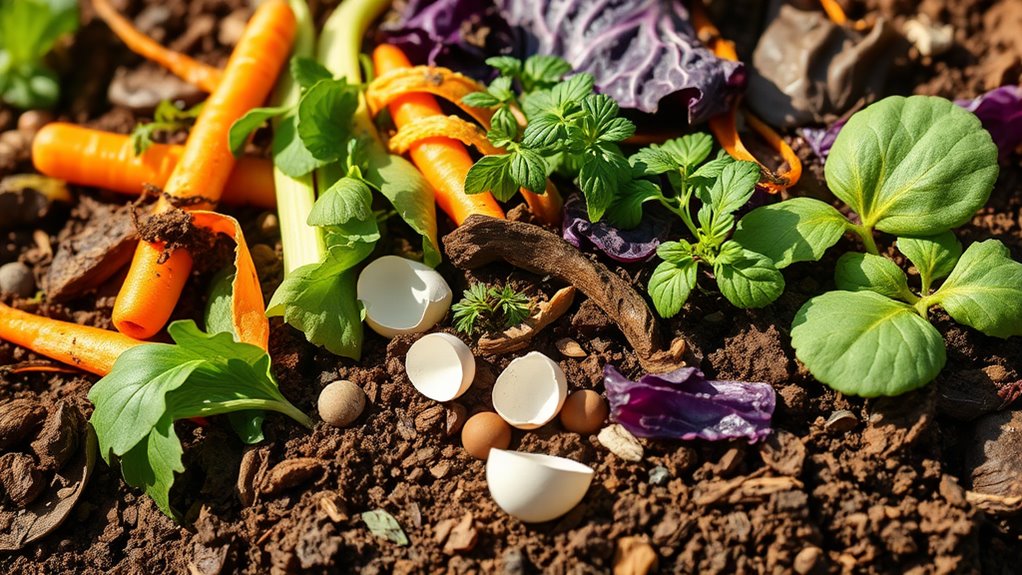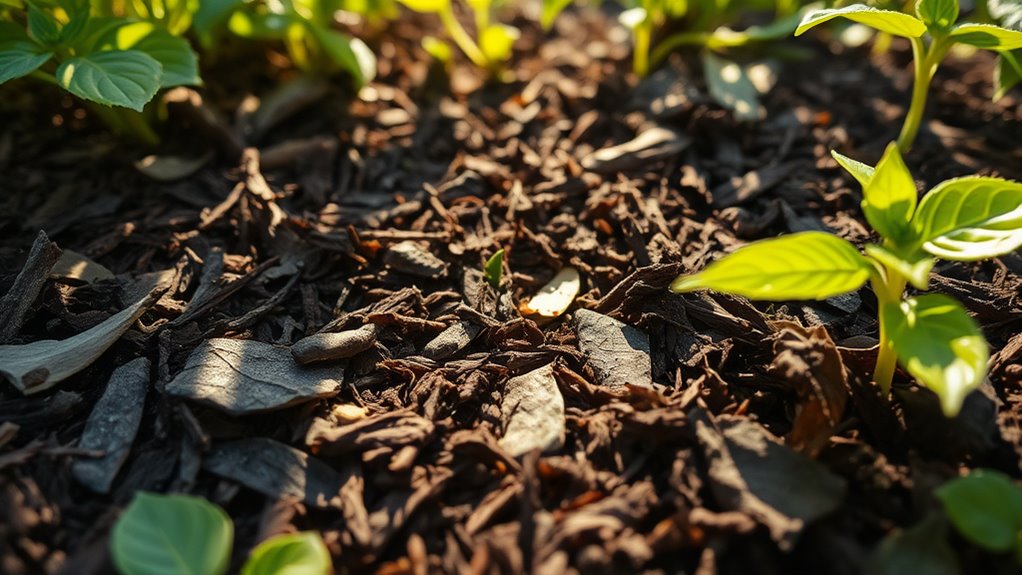This Is the Easiest Way to Start Composting Today
The easiest way to start composting today is by gathering kitchen scraps like vegetable peels and coffee grounds, along with yard waste such as leaves and grass clippings. Create a balanced mix of green (nitrogen-rich) and brown (carbon-rich) materials in a compost bin or pile. Turn it regularly to aerate and speed up decomposition. Keep it damp but not soggy. Soon, you’ll create nutrient-rich soil for your garden. Discover more tips for success ahead!
Understanding Composting Basics
Why should you consider composting? It’s a simple, eco-friendly way to reduce waste and enrich your garden.
Composting DIY involves collecting organic materials like fruit scraps, vegetable peels, and yard waste.
By combining green materials (nitrogen-rich) and brown materials (carbon-rich), you create a balanced mix that fosters decomposition.
Turning your compost regularly aerates it, speeding up the process.
You don’t need fancy equipment—just a space in your yard or a container can work.
With just a little effort, you’ll produce nutrient-rich compost that benefits your plants, reduces landfill waste, and contributes to a healthier environment. Transforming kitchen scraps into compost not only helps your garden thrive but also supports sustainable practices.
Start your composting journey today!
Choosing the Right Compost Bin
When selecting the right compost bin, how do you know which option suits your needs best?
Consider these factors:
-
Size: Choose a bin that fits your available space and composting volume. Smaller bins are great for limited areas, while larger ones suit bigger gardens.
-
Material: Opt for durable materials like plastic, wood, or metal. Each has its benefits, but make sure it’s sturdy enough for outdoor elements.
-
Aeration: Look for a design that promotes airflow. Bins with vents or turning features make composting faster and more efficient. Additionally, selecting a bin that allows for proper aeration can significantly enhance the composting process.
With the right bin, you’ll be on your way to successful composting!
What to Compost: A Beginner’s Guide
When you start composting, knowing what to toss in your bin is key to creating rich soil.
You’ll want to focus on kitchen scraps like fruit peels and yard waste such as leaves and grass clippings.
Let’s explore the essential compostable materials that will help you get your composting journey off to a great start! Additionally, incorporating garden waste like vegetable scraps and coffee grounds can significantly accelerate the composting process.
Kitchen Scraps Essentials
Composting your kitchen scraps is a simple yet powerful way to reduce waste and enrich your garden soil.
Start by collecting these essentials:
-
Fruit and Vegetable Peels: Toss in those banana peels, potato skins, and apple cores. They break down easily and add nutrients.
-
Coffee Grounds: Don’t throw away those used coffee grounds! They provide nitrogen and attract beneficial worms.
-
Eggshells: Crush and add eggshells. They’re rich in calcium, which helps strengthen plants.
Yard Waste Contributions
While kitchen scraps play an essential role in composting, yard waste is equally important and often more abundant.
Twigs, leaves, grass clippings, and plant trimmings provide vital carbon and nitrogen for your compost pile.
When adding yard waste, aim for a balanced mix with kitchen scraps to prevent odors and promote decomposition.
Shredding larger materials helps speed up the process, making it easier for microbes to break them down.
Don’t forget to layer your yard waste with other compostables and turn your pile regularly.
This way, you’ll create nutrient-rich compost that benefits your garden and reduces landfill waste. Happy composting!
Compostable Materials List
Creating a successful compost pile starts with knowing what materials you can include.
By choosing the right items, you’ll boost your compost’s efficiency and health.
Here are three essential categories to think about:
- Green Materials: These include kitchen scraps like vegetable peels and coffee grounds, which provide nitrogen.
- Brown Materials: Think dried leaves, cardboard, and straw—these add carbon to balance your compost.
- Water: Keep your pile moist but not soggy to promote decomposition.
What Not to Compost: Common Mistakes
When you start composting, it’s just as important to know what not to include as it’s to know what to add.
Avoid putting meat, dairy products, and diseased plants in your compost pile, as these can attract pests and spread diseases. Additionally, keeping your compost clean is key to creating a successful mix that benefits your garden.
Meat and Dairy Products
Have you ever wondered why meat and dairy products don’t belong in your compost pile?
These items can create problems you want to avoid.
Here’s why:
- Odor Issues: As they decompose, they produce strong smells that attract pests and rodents.
- Pathogen Growth: Meat and dairy can harbor harmful bacteria, risking contamination of your compost.
- Slow Decomposition: These materials break down slowly, disrupting the composting process and leading to an unbalanced mix.
Instead of composting them, consider disposing of meat and dairy in your trash or using a specialized composting system designed for these materials.
Diseased Plants and Weeds
Diseased plants and weeds are among the top offenders you should avoid composting. Adding them to your pile can spread pathogens and pests, ruining your compost and harming your garden.
If you notice any signs of disease, like spots or wilting, discard those plants in the trash instead.
Weeds, especially those that go to seed, can create a whole new problem, as they’ll thrive in your compost and invade your garden later.
Always prioritize healthy materials, and remember: when in doubt, throw it out.
Keeping your compost clean guarantees rich, healthy soil for your future plants.
Happy composting!
The Importance of Aeration
How can you guarantee your compost pile breaks down efficiently?
Aeration is key!
Without proper airflow, your compost can become compacted and smelly.
Here’s how to keep it oxygen-rich:
-
Turn your pile regularly: Use a pitchfork or compost aerator to mix in air and speed up decomposition.
-
Layer materials: Alternate green (nitrogen-rich) and brown (carbon-rich) materials to create pockets of air.
-
Use a compost bin with ventilation: Choose bins with holes or slats to encourage airflow.
Additionally, maintaining proper airflow in your compost is essential to prevent odors and ensure faster breakdown.
Maintaining Your Compost Pile
To keep your compost pile thriving, you need to monitor its moisture, temperature, and overall balance of materials.
Aim for a damp, but not soggy, consistency—think of a wrung-out sponge.
Check the temperature regularly; it should ideally reach between 130°F and 160°F. If it’s too cool, add more green materials like kitchen scraps.
Keep an eye on the balance of greens and browns—around one part green to three parts brown works well.
Turning the pile every few weeks helps aerate it and speeds up decomposition. Utilizing low-effort composting methods can make this process even easier for busy beginners.
With a little attention, you’ll create nutrient-rich compost in no time!
Troubleshooting Common Issues
Even with careful maintenance, you might encounter some common issues while composting.
Don’t worry; troubleshooting can be simple!
Here’s what to look out for:
-
Foul Odor: If your compost smells bad, it may be too wet or lacking aeration. Turn it more often and add browns like dry leaves.
-
Pests: If you spot unwanted critters, avoid adding meat or dairy. Keep the pile covered to deter them.
-
Slow Breakdown: If compost isn’t breaking down, it might need more nitrogen-rich materials. Add green scraps and mix well. Additionally, ensure that your compost has proper aeration to promote efficient decomposition.
With these tips, you’ll keep your compost healthy and happy!
Using Finished Compost in Your Garden
Incorporating finished compost into your garden can transform your soil and boost plant health.
Spread a layer of compost around your plants to improve soil structure, retain moisture, and provide essential nutrients.
Mix it into your garden beds before planting to enhance fertility and support robust growth.
You can also use compost as a top dressing for established plants, giving them a nutrient boost through the growing season.
Remember to monitor moisture levels, as compost can help retain water but still requires regular watering.
With these practices, you’ll cultivate a thriving garden that flourishes with your homemade compost.
